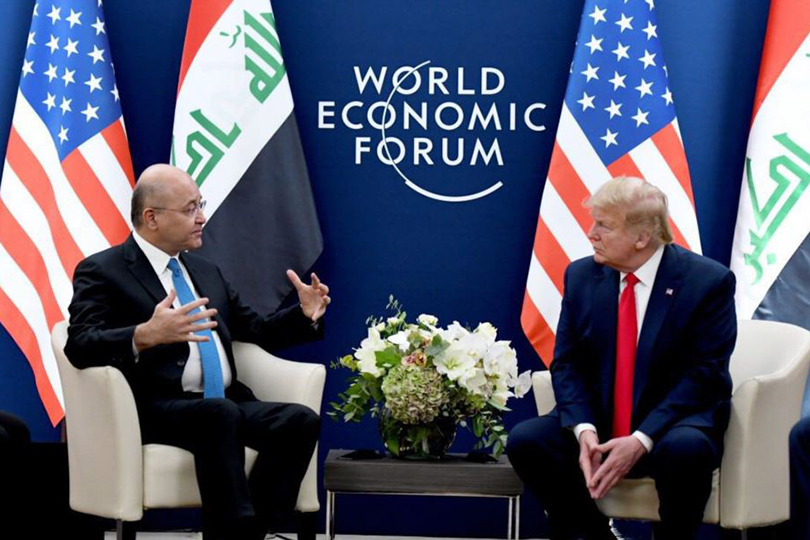Do the United States and Iraq, joined at the hip in tragic and mistake-prone war for most of the past 17 years, have a future together? As Iraq seeks to form a new government, its parliament is on record recommending that U.S. forces be expelled in the aftermath of the early January killing of Iranian terror mastermind Qassam Soleimani. Those tensions could again be inflamed by the Amerian and allied retaliation, early on March 13, for recent rocket barrages against foreign forces in Iraq by Iranian-backed militias that killed two Americans and a Brit. Over the following weekend, another round of barrages occurred, with the potential for yet more American retaliation. The partnership appears to be in peril.
It would a tragic shame if it ended. For Iraqis, the American presence is hugely beneficial as a counterweight to Iran and ISIS. Americans are also helpful with Iraqi internal politics—especially in regard to sectarian divisions in the security forces. Kurds, Shia and Sunni Iraqis may all have their issues with the United States. But few view Washington as inherently biased against them.
It was under Generals Petraeus, Odierno, Austin and others that the Iraqi army and police were reformed during the surge period of 2007-2008, making them effective across sectarian and geographic lines. It was only after the return of U.S. forces in 2014 that the Iraqi army, which had otherwise become polarized and divided—and which often melted away in the face of ISIS advances—was rebuilt such that it could reestablish control of regions of the country where ISIS had taken root.
WE HAVE A VESTED INTEREST IN IRAQ’S SUCCESS
For the United States, there are also important reasons to sustain the close partnership—and help Iraqis defend their own country. That became crystal clear in 2014, when President Obama, after having celebrated the withdrawal of all U.S. troops from Iraq in 2011, had to send them back to contend with ISIS. Otherwise, even larger refugee flows into Europe and beyond would have resulted, and major centers of oil production near the Persian Gulf could have been threatened. ISIS and related Salafists remain a threat today, even if they no longer hold territory in Iraq.
If Americans want to limit Iran’s influence in the region, moreover, there is no better place to start than right next door. Despite the fact that most Iraqis and Iranians share a Shia faith, Iraqis are a proud people who do not wish to be subservient to anyone. Yet Iran is very sophisticated at covert and power politics; Iraqis can only maintain their true independence if they have other friends, and a functioning political system, as well.
For a United States that prefers to secure its core interests in the Middle East—dependable flow of oil, prevention of nuclear proliferation, stomping out of terrorism, protection of key friends like Israel and Jordan—without sending large numbers of its own forces again to the region, the need for strong partners is evident.
To sustain the American presence in Iraq into the future, greater clarity between Baghdad and Washington on rules of engagement is crucial. Iraq needs to do much more to help protect American bases and other interests in the country. The United States needs to limit any unilateral use of military force to direct defense or hot pursuit of those who may have fired upon its forces. Any other actions, however justifiable (like those of March 13), should be undertaken only after consultation and agreement between the two governments.
It is also imperative that the next Iraqi government and NATO rethink the goals of their combined training program. One key goal should be that combat units will not be positioned inside urban areas. Instead, they should be located in rural areas, and in locations where they can tackle external aggression whether it comes from the south, east or west. Internal matters should be left to the federal police and domestic security agencies.
PRACTICAL MEASURES TO STRENGTHEN THE NATION
Mandatory conscription could also be considered as a way of overcoming sectarian tensions and building a strong sense of nationhood among troops. Unity can also be encouraged through rejecting sectarianism, specifically when making appointments to government positions.
Some measures go beyond the security forces. For example passing fair and equitable hydro-carbon and revenue-sharing laws that allocate funds consistently across the entire country would foster cohesion of all provinces in Iraq.
High unemployment is also a major problem—and was a key cause of last year’s many demonstrations throughout Iraq. It can be mitigated in a number of ways. If done fairly, privatization of state-owned entities can help, especially if employees are allowed to own shares, and the United States and others should stand ready to help including with temporary financial assistance if that can be useful in the process.
Iraq also cannot have multiple armies. Militias must be terminated. Those capable of combat can be recruited into the armed security services. Those that are not must be demobilized, but their fighters should be offered compensation and job opportunities.
Many of the above steps will benefit from American advice and limited amounts of technical assistance and aid. Washington should want to provide it, and Baghdad should want to accept the help. As a new Iraqi government settles into power, it is time for both Americans and Iraqis to take a deep breath and realize that, even if the last years and decades have been tough, we are much better together than apart.







Comments